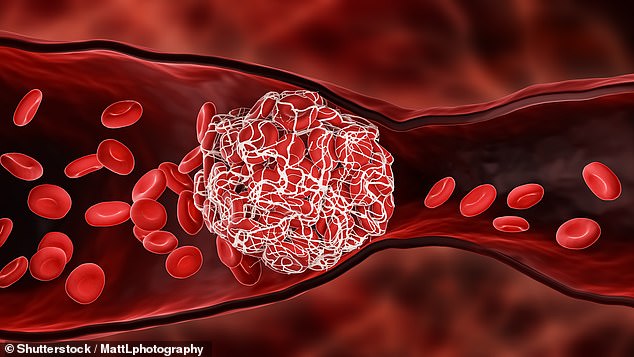Are you at risk of developing a deadly blood clot... at work?
It has long been known that sitting during long haul flights can trigger life-threatening blood clots.
But a healthcare expert told the Daily Mail that it's a danger in the office, too—particularly if you spend huge swathes of your working day sat at your desk, in a position which millions of Britons find most comfortable.
Tristan Hulbert, Managing Director at Vivid Care—which provides healthcare equipment—says sitting with your legs crossed can put you at even higher risk.
This is because this position can restrict blood flow to the lower limbs, causing a condition called 'e-thrombosis', he warned.
The term 'e-thrombosis'—first coined in 2003—refers to deadly blood clots that are computer related, like from sitting at your desk at work, or spending hours in a trendy gaming chair while playing a console.
'When you cross your legs while sitting, you create pressure points that can significantly restrict circulation,' he said.
'The veins in your legs get compressed, which slows blood flow and increases the chance of clot formation.
He added that many people sit for eight or more hours a day without changing their position, putting themselves at risk without knowing it.


'The human body simply simply wasn't designed to stay in one position for hours on end,' he told the Daily Mail.
He recommends getting up to walk around to stimulate blood flow at least every 90 minutes.
'Just a quick walk to make a cup of tea allows blood to circulate properly through your legs and reduces risk of developing a clot,' he explained.
Previously a study found sitting with your legs crossed can change the speed blood moves through blood vessels in lower limbs—which may raise risk of blood clots.
Mr Hulbert recommended three simple ways to prevent the deadly blood clots. 'First, keep both feet flat on the floor when sitting,' he said.
'Second stand up regularly throughout your workday. Third, stretch your legs and rotate your ankles periodically when you must sit for long periods.'
He also advised against tucking legs underneath chairs, because it 'creates the same circulation problems as crossing them', he explained. Instead try keep the legs stretched out in front of you when possible,' he added.
And if you can't remember to get up for a quick walk, he suggests setting phone alarms as reminders to move.

'Most phones have built-in timers. Set yours for 90-minute intervals as a prompt to stand up and walk around.'
It's also a problem for gamers, warned Mr Hulbert, as 'online gaming sessions often last several hours, with players rarely changing position'.
'Taking regular breaks might seem annoying, but your health matters more than reaching the next game level,' he advised.
'Small adjustments to how you sit and how often you move can make a substantial difference to your circulation health,' he added.
'Your future self will thank you for uncrossing those legs today.'
These blood clots are usually due to venous thromboembolism (VTE) which is estimated to affect one to two in every 1000 people in the UK.
It includes deep vein thrombosis (DVT) and pulmonary embolism (PE). DVT is when there's a blood clot deep in a vain and PE is when it a clot breaks off, travels to the lungs and blocks a main artery.
Symptoms DVT pain, tenderness, swelling, warmth and skin discolouration in the affected area, often in the leg.
Meanwhile symptoms of PE include sudden shortness of breath, chest pain, fast or irregular heart beat and coughing up blood.
If the blood clot travels to the lungs it can be life-threatening if not treated quickly.
And around 25,000 people who are admitted to hospital in the UK, die from preventable blood clots each year, according to the NHS.
According to the NHS if you think you have DVT you should ask for an urgent GP appointment or get help.
Meanwhile if you have breathlessness or chest pain you should immediately call 999 or go straight to A&E.
Read more- Could your seating habit during flights secretly threaten your health? Discover the surprising position linked to increased risk of deep vein thrombosis!
- Are your flight habits secretly risking your health? Uncover Lee's top tips for preventing dangerous blood clots on your next journey!
- What serious health dangers lurk behind blood clots, and why must they be treated immediately?
- Can wearing tight leggings on flights increase the risk of deep vein thrombosis and other serious health issues?
- Could you be one of the 23 million Britons plagued by varicose veins? Discover if you're at risk!
Post a Comment for "Are you at risk of developing a deadly blood clot... at work?"